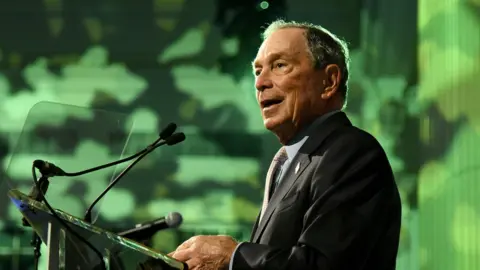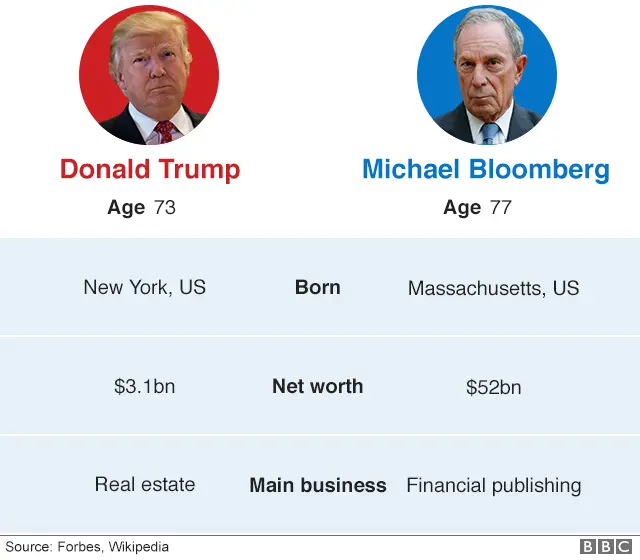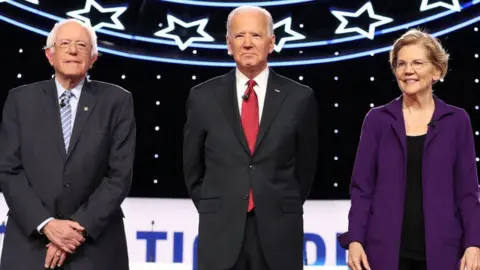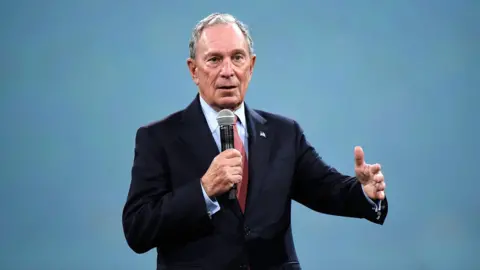US election 2020: Michael Bloomberg joins race for White House
 Getty Images
Getty ImagesBillionaire former New York City Mayor Michael Bloomberg has signalled he will join the race to secure the Democratic Party's nomination for US president.
He has filed paperwork ahead of a deadline for the Democratic primary election in Alabama.
The move is a necessary step to join the race to be the party's candidate to take on President Donald Trump in next year's election.
Mr Bloomberg, 77, has not formally confirmed his candidacy.
However, spokesman Jason Schechter told US media that an announcement "could come as early as next week".
The businessman is said to be concerned the current Democratic contenders would not pose a strong enough challenge to Mr Trump in 2020.
He will be entering a crowded field as one of 17 candidates hoping to be chosen as the Democratic nominee.
Former Vice President Joe Biden is the frontrunner, followed by senators Bernie Sanders and Elizabeth Warren.
The tycoon had strongly hinted that he would run, with his adviser Howard Wolfson releasing a statement on Thursday evening saying they wanted to "ensure that Trump is defeated" in the election next year.
"But Mike is increasingly concerned that the current field of [Democratic] candidates is not well positioned to do that," he added.
His comments came after months of debate over wealth inequality in the US, with Mr Sanders and Ms Warren announcing plans for steep tax rises for billionaires. Unveiling his tax proposals in September, Mr Sanders said: "Billionaires should not exist."
Mr Bloomberg is estimated to be worth $52bn.
On Friday, President Trump taunted Mr Bloomberg by saying there was "nobody I'd rather run against than little Michael".
Mr Bloomberg filed his papers in Alabama later the same day.
Better late than never?
Mr Bloomberg is said to be fully aware such a belated entry to the race presents challenges in states like Iowa and New Hampshire, where other Democratic contenders have been campaigning for months.
The Bloomberg team reportedly sees a possible pathway through the so-called Super Tuesday contests in March, when 14 states - including California, Alabama and Colorado - will vote on a single day for their preferred White House nominee.
Mr Bloomberg considered running for the White House as an independent candidate in both 2008 and 2016.
In March of this year he had said he would not join the 2020 race.
 Getty Images
Getty ImagesWhat happens after Alabama?
Mr Bloomberg's advisers are reportedly preparing the paperwork for other states with nearing deadlines. Both Arkansas and New Hampshire require candidates to file by next week.
State-by-state votes, known as primaries and caucuses, will be held from February next year to pick a Democratic White House nominee.
The eventual winner will be crowned at the party convention in Wisconsin in July. He or she is expected to face President Trump, a Republican, in the general election in November.

What's the other reaction?
Mr Biden told media on Friday that he had "no problem" with Mr Bloomberg joining the Democratic field.
"Michael is a solid guy," Mr Biden said. "Let's see where it goes."
Ms Warren welcomed Mr Bloomberg to the race on Twitter, linking to her own campaign website and suggesting the former mayor take a look for potential policy plans.
In tweet seemingly directed at Mr Bloomberg, Mr Sanders wrote: "The billionaire class is scared and they should be scared."
Some recent opinion polls have suggested that Ms Warren and Mr Sanders - who are more politically liberal than Mr Biden - might face an uphill battle against Mr Trump.
The Republican National Committee said in a statement that the billionaire's prospective entry "underscores the weak Democrat field".
 Chip Somodevilla/Getty Images
Chip Somodevilla/Getty ImagesWho is Bloomberg?
Mr Bloomberg was a Wall Street banker before going on to create the financial publishing empire that bears his name.
His net worth is $52bn (£40bn), according to Forbes. This is 17 times more than Mr Trump's (estimated at $3.1bn).
He staged a successful campaign for New York mayor in 2001, remaining in office for three consecutive terms until 2013.
A philanthropist, he has donated millions of dollars to educational, medical and other causes.
Why is he running now?
Analysis - Anthony Zurcher, BBC News, Washington
Why is he contemplating a run for the highest political job in the land just a few months after announcing he would watch 2020 from the sidelines?
Here are a few theories:
- Because he thinks he can win
- Because he wants to shape the debate
- Because he can afford to
The top one is the obvious response. Mr Bloomberg has plenty of pollsters and political strategists at his disposal, and is reported to be a very data-driven businessman. It doesn't take an advanced degree in quantitative analysis, however, to realise that the Democratic field, even at this (relatively) late date, is still in flux.
There are four candidates at or near the top of early state and national primary polls - Joe Biden, Elizabeth Warren, Bernie Sanders and Pete Buttigieg. All of them have their strengths, of course, but all of them also have obvious weaknesses.
What does Bloomberg believe in?
Originally a Democrat, Mr Bloomberg became a Republican to mount his campaign for New York mayor in 2001.
Now regarded as a moderate Democrat, he rejoined the party only last year.
 Getty Images
Getty ImagesMr Bloomberg has liberal views on issues such as climate change, gun control, immigration and abortion rights.
He was credited this week with helping Democrats win control of Virginia's legislature, after his gun-control advocacy group Everytown for Gun Safety injected $2.5m into the state's election.
But Mr Bloomberg is more conservative on topics like the economy and policing.
As mayor, he defended the New York Police Department's stop-and-frisk policy, which critics say disproportionately targeted African Americans and Hispanics.
At city hall, Mr Bloomberg banned supersize sodas to prevent obesity, but was overruled by the state's Supreme Court.
